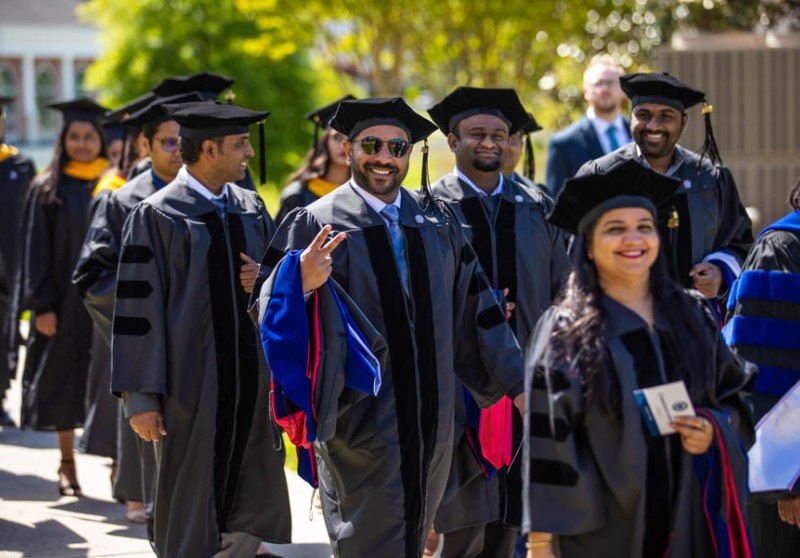If business is a game of supply and demand, you’d better manage your supply chain well.
Supply-chain systems can be complex, but managing them doesn’t have to be. At UC, our executive Master of Science in Supply Chain Management program explores the ins and out of supply-chain systems to help you acquire the knowledge and skills needed to effectively manage them. From developing critical thinking to acquiring technological skill to strengthening collaboration skills, you’ll be prepared to oversee your company’s supply chain management program from end-to-end even when unexpected shifts in demand or technology occur. Plus, this executive master’s supply chain management degree is offered in a hybrid format, giving you the freedom and flexibility to fit your executive supply chain management program around your other commitments and responsibilities.
By the Numbers
Programs & Requirements
Executive Master's in Supply Chain Management
Without smooth supply chain operations, overall business performance suffers as supply chain management plays an important role in ensuring that products and services are delivered efficiently and effectively to customers. Supply chain systems encompass all activities involved in the production and delivery of goods and services, including procurement, transportation, inventory management, and logistics. By more effectively managing the flow of goods and services from suppliers to customers, you can better identify inefficiencies and areas for improvement. This executive master’s in supply chain management degree will help you develop practical skills for maintaining supply chain operations and a strategic understanding of the field to optimize operations and reduce costs.
Course Requirements
- SCM 600 - Supply Chain Management Foundations
- SCM 605 - Supply Chain Management Reporting Systems
- SCM 610 - Supply Chain Management Modeling, Simulation, and Analytics
- SCM 615 - Supply Chain Management Operation and Production Technologies
- SCM 620 - Supply Chain Management Logistics, Transportation, and Distribution Systems
- SCM 625 - Supply Chain Management Inventory, Warehousing, and Forecasting
- SCM 630 - Supply Chain Management Planning and Control Systems
- SCM 635 - Supply Chain Management Quality Assurance and Control Systems
- SCM 640 - Supply Chain Management Sourcing, Procurement, and Contract Administration
- SCM 645 - Supply Chain Management Sustainability, Resilience and Risk Analysis
Choose from two courses (1 credit hour) to round out the required credit hours needed for your Master of Science program.
- SCM 695 - Supply Chain Management - Capstone*
- INTR 599 – Applied Learning Practicum
This capstone course is designed to give you an opportunity to integrate and apply the knowledge you have acquired over your entire discipline of study. It will serve to help assess your overall learning experience and intellectual growth in your program of study. The course should be taken during your final semester.
*All online students who are seeking to earn this degree must take this course in lieu of INTR 599, in addition to meeting all program degree requirements. Executive format students can substitute the required INTR 599 course in lieu of SCM 695 as part of their program degree requirements.
** Executive format programs have an applied learning component (internship or practicum) that is an integral and essential part of the established curriculum. Due to the applied learning component required for the degree program, Executive format students must enroll in INTR every term of enrollment.

Executive Student Resources
UC's Department of International Graduate Services enjoys providing support resources for our international students. Find tutorials and information regarding offices and policies for the International Graduate Students and programs.
Executive Program Format
Our Executive Programs include hybrid course days designed for international graduate students studying in the U.S., or domestic students seeking a hybrid-format program. We strive to incorporate professional experience and real-world application of course curriculum into our programs to enhance the learning experience. Practical Training is an integral part of program coursework and available to all students. At the University of the Cumberlands our degree programs focus on quality education at an affordable price.
Executive Program students take three (3) courses per semester. The program semester is based on the existing UC semester calendar, with three (3) annual semesters: fall, spring, and summer. Two of the courses each semester focus on the specific program content. Additionally, students will be required to attend an intensive residency weekend as part of their course enrollment each term. The third class includes an Applied Learning Practicum, in which students apply what they are learning in their other two courses to the real world via work or internship experiences.
Residency FAQs
Residency Session dates are determined by the course that you are registered for. It is very important that you make note of the class you registered for, as well as the designated residency weekend for that course as each course will only meet one weekend for the duration of the semester.
Even though we will only be meeting one weekend per semester, we will have the same number of contact hours with you. This will enable the instructors to make residency weekends much more valuable. This change will allow us to have meaningful projects on residency weekends.
You can view your semester schedule in your self-service portal in your Student Profile. Once you log into your MyUC account, click on Academics, then click on Current Schedule. Your schedule details will indicate the date and location of your residency weekend.
You can find information on the residency site locations on our website.
Yes, all three days are mandatory, and requests to arrive late or leave early will not be approved. Should you not be in attendance for the full session, you will be counted absent for the entire session. Please plan travel accordingly!
Attendance to each executive residency class session is mandatory. Students may make up no more than one (1) residency session throughout the duration of their academic program. Missing a second residency will result in the student being dismissed from the university.
A missed session will result in the student attending a make-up session, and paying a $300 residency make-up fee. In addition, the student may be asked for documentation from the program department providing an explanation as to why the scheduled residency session was missed. Make-up sessions must be completed prior to the end of the term. Noncompliance with this policy will result in dismissal from the executive program.
Make-up residency sessions will be held at our campus in Williamsburg, KY. You will be contacted with the time and dates after your absence is reported. There will only be one (1) residency make-up session offered each semester. Failure to attend all days of the makeup session will result in receiving a failing grade for the course, as well as potential dismissal from the University, and SEVIS termination.
If you cannot be in attendance for all three days then you will be counted absent for the entire residency weekend and be required to attend the make-up residency and pay the $300 make-up fee.
The Department of International Graduate Services will contact you via your UC student email as registration for the next term approaches. Please remember that you are required to register for (one) main class, (one) online class, and Applied Learning Practicum each semester in order to maintain your F1 status – late registration will not be accepted and can result in the termination of your student status.
Once you register for a class you will want to make note of the residency weekend that your class is scheduled, as that is the only session for that class that will be scheduled for the semester. You will need to be sure to plan your travel accordingly to ensure that you are in attendance for the full residency session.
Registration is done on a first-come, first-serve basis. Once a course is full, there will not be additional seats added, as we cannot exceed classroom seating capacity; therefore, it is advised that you register for classes as much in advance as possible. As a reminder, students cannot register for future semesters until their current tuition balance is paid in full.
*Please note all times are in local time zone*
Friday
Facility will open at 4:00 p.m.
Saturday
Facility will open at 7:00 a.m.
Sunday
Facility will open at 7:00 a.m.
We ask that you please take note of the above-mentioned times and schedule your travel accordingly.
*These dates have been set; however, if any changes are made, they will be made prior to registration for that semester. Not all dates are available at each residency location.
Fall 2024 (August 26th – December 13th)
- September 27 – 29
- October 4 – 6
- October 11 – 13
- October 18 – 20
- October 25 – 27
- November 1 – 3
- November 8 – 10
- November 15 – 17
- November 22 – 24
Spring 2025 (January 6th – April 30th)
- January 31-February 2
- February 7-9
- February 14-16
- February 21-23
- February 28-March 2
- March 7-9
- March 14-16
- March 21-23
- March 28-30
- April 4-6
- April 11-13
Take the Next Step
Supply Chain Management Mission & Goals
The executive supply chain master's program preparing graduates to lead and manage complex supply-chain systems, drive innovation, use technology effectively, and create value for organizations and stakeholders.
Supply Chain Management Careers & Outcomes
All stats from U.S. Bureau of Labor Statistics
Logistician: $77,520
Logistician: $77,520
Logisticians analyze and coordinate an organization’s supply chain.
Distribution Manager: $98,560
Distribution Manager: $98,560
Transportation, storage, and distribution managers plan, direct, or coordinate relevant logistical activities in accordance with organizational policies and applicable government laws or regulations. Includes logistics managers.
Purchasing Agent: $75,120
Purchasing Agent: $75,120
Buyers and purchasing agents buy products and services for organizations. Purchasing managers oversee the work of buyers and purchasing agents.
Project Management Specialist: $95,370
Project Management Specialist: $95,370
Project management specialists coordinate the budget, schedule, staffing, and other details of a project.
Operations Manager: $98,100
Operations Manager: $98,100
Operations managers plan, direct, or coordinate the operations of public or private sector organizations, overseeing multiple departments or locations.
Industrial Production Manager: $107,560
Industrial Production Manager: $107,560
Industrial production managers oversee the operations of manufacturing and related plants.
Common Questions in Supply Chain Management
An executive master's in supply chain management is a specialized graduate program designed for working professionals. It focuses on end-to-end supply chain oversight, covering topics such as procurement, transportation, inventory management, and logistics to help manage and optimize the flow of goods and services.
The program typically requires 31 credit hours and can be completed in about 12-18 months, depending on the student's pace and whether they are studying full-time or part-time
Yes, many programs offer a hybrid format, which combines online coursework with in-person sessions. This format provides flexibility for professionals to balance their studies with their work and personal responsibilities.
Earning an executive master's in supply chain management can be highly beneficial for career advancement. It equips professionals with the knowledge and skills needed to manage complex supply chain systems, making them competitive for higher-level positions and increasing their potential for career growth in a field with strong demand.
Graduates can pursue various roles, including logistician, distribution manager, purchasing agent, project management specialist, operations manager, and industrial production manager. These roles involve coordinating and optimizing the supply chain operations of organizations to ensure efficiency and cost-effectiveness.
To enroll, you need to meet the standard graduate admission requirements, which typically include relevant work experience, an undergraduate degree in business, logistics, or a related field. The application process usually involves submitting transcripts, letters of recommendation, a statement of purpose, and sometimes a resume or CV.

Executive Program Admission Requirements
All students in our executive programs are required to meet a standard set of admissions requirements for graduate students.
Faculty Experts in Supply Chain Management
Learn more about the professors you will interact with.

Dr. Divine Fondem

Dr. Sean-Michael Green

Dr. Dean Gualco
Request Information
Let us know of any questions that you may have!

